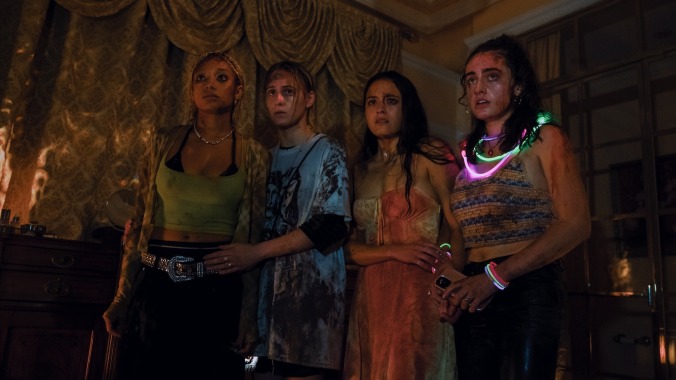In the murderously fun Bodies Bodies Bodies, Gen Z privilege is the first victim
Amandla Stenberg leads a killer cast through a night of bloodshed, parlor games, and social satire

In Dutch director Halina Reijn’s freewheeling and incisive horror comedy Bodies Bodies Bodies, Gen Z characters get their throat slit, fall from the top of a staircase and get shot. Yet for these twentysomething party people who’ve gathered at an isolated New York mansion to ride out an oncoming hurricane, there’s nothing deadlier than a well-delivered insult. And there are plenty to go around in this razor-sharp skewering of group dynamics in the digital age. Taking place over one rain-soaked night, Bodies Bodies Bodies is a tense and increasingly violent takedown of friendships built on a flimsy foundation of TikTok dances and group chats. Featuring a rock-star collection of young actresses, led by Amandla Stenberg (The Hate U Give), the film uses horror tropes to coax the insecurities and buried resentments out of friends whose insecurities and buried resentments are all they have in common.
Reijn starts off by deftly introducing each character and whatever annoying personality trait will become most crucial as the evening begins to break down. Sophie (Stenberg) is the last member of her clique to pull up to the dark and woodsy mansion where she and her girlfriends will drink, do rails and hook up while a powerful hurricane drenches the area. Upon arrival, Sophie is ripped for not participating in their group chat. The fact she’s been in rehab barely counts as an excuse. Sophie is accompanied by a newcomer, her freshly minted, middle-class girlfriend Bee (Maria Bakalova from Borat Subsequent Moviefilm), who’s so shy and uninitiated in the ways of these vipers that she brings zucchini bread as a thank you gift.
The mansion is owned by the family of the supremely punchable David (played by the supremely punchable Pete Davidson, wearing a pink tracksuit he probably brought from home), whose belligerent attitude sets the tone for the evening. He reduces his girlfriend, Emma (Chase Sui Wonders), to tears by accusing her of not having an original thought in her head. Then he gets aggro with Greg (Lee Pace), the much older, Tinder boyfriend of Alice (Rachel Sennott from Shiva Baby). She’s an airheaded podcaster whose podcast sounds awful, a view supported by Sophie’s ex-girlfriend, Jordan (Myha’la Herrold), who can only manage to hate-listen to it. None of these supposed friends seem to like each other very much but they stay connected because the social pecking order demands it, as does, according to Alice, “the suffocating weight of our shared history.”
Working with cinematographer Jasper Wolf, Reijn creates a darkly oppressive, pressure-cooker atmosphere that’s ripe for exploding when the proper conditions arise. What gets it going is when the group plays a game of Bodies Bodies Bodies, which involves turning off the lights until the designated killer “murders” someone by tapping them on the back and then the survivors guess whodunnit. When one of the partygoers actually ends up dead and the hurricane knocks out power and cell service, everyone panics, blame is passed around, and the virtue signaling, wokeness, and performative allyship that Gen Zers use to define themselves become weapons of suspicion and derision.
As the body count increases and the women grow more distrusting of each other, the foundation of buzzwords upon which they’ve constructed their identity starts feeling increasingly fragile. Without sounding forced and without condescension, screenwriter Sarah DeLappe finds room for all the empty phrases that puff up the socially conscious bona fides of young, upper-class snobs. Emma sounds petty and petulant throwing around words like “gaslighting” and “toxic,” while Sophie calls out being triggered. The neurotic Alice claims she has body dysmorphia, as if being any type of victim is a mic-drop excuse for all bad behavior.
Reijn, though, isn’t shaming her characters for any of this, nor is she attempting a boomer-approved takedown. The film is more observational than scathingly critical, and there are moments when we’re not sure if that’s a problem—or the point. All this mayhem never really adds up to much, as if calling out Gen Z for the folly of their well-intentioned faults was enough. And yet, it is enough, thanks to the film’s very game and hard-working cast. The charismatic Sennett leads the pack, proving herself a terrific physical comedienne, while Bakalova, as the foreigner who draws much suspicion from the others, maintains her exterior cool so well that she’s in pole position to be the killer.
Reijn, whose last directing effort was Instinct, the Netherland’s 2019 Best International Feature Film Oscar submission, directs with a loose, improvisational energy. If she keeps too loose a grip on the reins, occasionally letting scenes meander, there’s another surprise or biting line of dialogue to get things back on track. While there’s plenty of blood and nasty kills, Reijn is not here to provide a true horror film experience. The search for the murderer, which culminates in a hilarious twist ending, is just a pretext to turn the screws on a bunch of hypocritical, virtue-signaling culture warriors until the shallowness of their convictions is revealed.
With its biting, class-aware humor and escalating body count, Bodies Bodies Bodies is the intersection of a rather sprawling Venn diagram that would include films like Mean Girls, Heathers, And Then There Were None, Lord Of The Flies, The Exterminating Angel, and even The Rules Of The Game. All those films traffic in fear and insecurity within a group. Bodies Bodies Bodies, shrewdly and with abandon, adds social media-fueled performative wokeness to the mix and makes a damning case for their limits in the real world. If the film has any takeaway, it’s that a TikToker’s DEI-embracing identity is only as strong as their Wi-Fi signal.